
"Linger" is a song by Irish alternative rock band the Cranberries from their debut studio album, Everybody Else Is Doing It, So Why Can't We? (1993). Composed by band members Dolores O'Riordan and Noel Hogan, and produced by Stephen Street, "Linger" was first released as the second and final single from the album on 15 February 1993 by Island Records. It was later re-released on 31 January 1994.

Emancipation is the nineteenth studio album by American recording artist Prince. It was released on November 19, 1996, by NPG Records and EMI Records as a triple album. The title refers to Prince's freedom from his contract with Warner Bros. Records after 18 years, with which he had a contentious relationship. The album was Prince's third to be released that year, which made 1996 one of the most prolific years for material released by Prince.

"Strange Currencies" is a song by American rock band R.E.M. It was included on their ninth studio album, Monster (1994), and was released as the album's fourth single on April 18, 1995, by Warner Bros. Records. The song reached number nine on the UK Singles Chart and peaked at number 47 in the United States. Like "Everybody Hurts" on R.E.M.'s previous album, it has a time signature of 6
8. The song's music video was directed by Mark Romanek.

"The Sidewinder Sleeps Tonite" is a song by American alternative rock band R.E.M. It was influenced by the song "The Lion Sleeps Tonight", both in the title of the song and through the song's opening refrain. The band used "The Lion Sleeps Tonight" as the B-side to this song in the U.S. The song was released on R.E.M.'s 1992 album, Automatic for the People, and was later released as a single in February 1993, reaching number one in Iceland, number 13 in Ireland, number 17 in the United Kingdom, and number 29 in New Zealand. Its music video was directed by Kevin Kerslake.
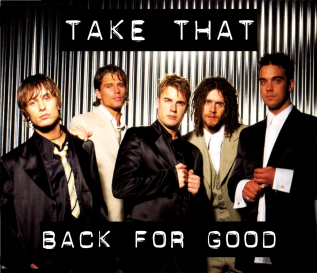
"Back for Good" is a song by English band Take That from their album Nobody Else (1995). A ballad, "Back for Good" was written by lead singer Gary Barlow and released on 27 March 1995. The song hit number one in 31 countries, including the UK. At the 1996 Brit Awards, "Back for Good" won the Brit Award for British Single of the Year.
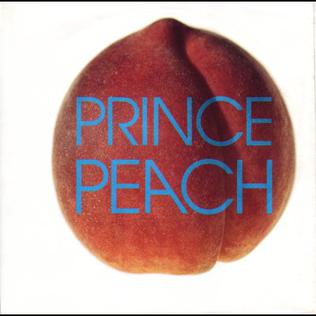
"Peach" is a song by American musician Prince, released in October 1993 by Paisley Park Records and Warner Bros. Records from his 1993 compilations, The Hits 2 and The Hits/The B-Sides. He both wrote and produced the song, featuring a female gasp performed by American actress Kim Basinger. "Peach" peaked at number seven on the US Billboard Bubbling Under Hot 100 Singles chart; however, it did peak at number 14 in the United Kingdom. Its B-side, "Nothing Compares 2 U", charted at number 62 on the Billboard Hot R&B Singles chart. Prince performed the song live during his 1993 tour. It was the main sound theme of the Spanish-language talk show Corazón, Corazón in the mid 1990s. The accompanying music video was filmed inside and outside of Prince's residence, Paisley Park, and was included in The Hits Collection on home video.
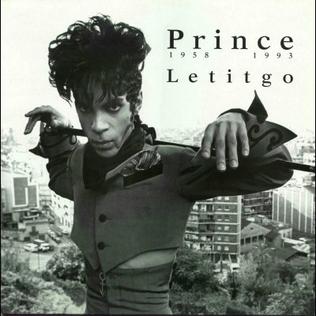
"Letitgo" is a song by American musician Prince from his fifteenth studio album, Come (1994). Despite statements that the album consisted entirely of "old" material, "Letitgo" was actually newly composed for the album. The mid-tempo song relies heavily on a drum machine pattern and bass guitar with synthesizers in the refrain. A keyboard and percussion solo appear toward the end. The song is sung in falsetto in unison with another track layered in his regular, lower register. Kathleen Bradford provides backing vocals, while Eric Leeds provides flute accompaniment.

"The Most Beautiful Girl in the World" is a song by American musician Prince, released in various forms on the 1994 remixes EP The Beautiful Experience and later on his seventeenth album, The Gold Experience (1995). In his singles chronology, it was his third major release since changing his stage name to an unpronounceable "Love Symbol". In his albums chronology, it along with the EP was his second release after changing his name.

"I Hate U" is a song by American musician Prince, released on September 12, 1995 by NPG and Warner Bros., as the lead single from his seventeenth studio album, The Gold Experience (1995). It was also Prince's last original single to reach the US Top 40, peaking at number 12 on the Billboard Hot 100. In the UK, it peaked at number 20. A music video was produced to promote the single, but never officially released until it was made available after Prince's death, on the official Prince YouTube channel in 2018.
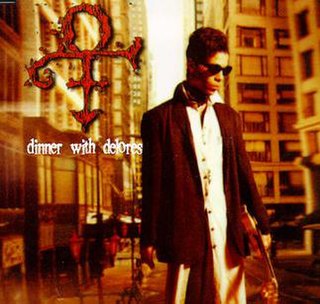
"Dinner with Delores" is a song by American musician Prince, released as the only single from his 19th studio album, Chaos and Disorder (1996). Although the single was not released in the United States, the promotional video was shown on music video channels there.

"Betcha by Golly, Wow" is a song written by Thom Bell and Linda Creed, originally titled "Keep Growing Strong" and recorded by American actress and singer Connie Stevens under the Bell label in 1970. Stevens' recording runs two minutes and thirty seconds. The composition later became a hit when it was released by the Philadelphia soul group the Stylistics in 1972 under its better known title, "Betcha by Golly, Wow".

"The Greatest Romance Ever Sold" is a song recorded by American musician Prince, under his unpronounceable stage name called the "Love Symbol". It was released as the only single from his twenty-third studio album Rave Un2 the Joy Fantastic (1999). It was issued on October 5, 1999, in several different formats, including a 12-inch single, CD single, and a maxi single. Prince solely wrote and produced it, while Mike Scott provided guitar strings for the track. Several music critics found the single reminiscent to the works on his previous studio album, Diamonds and Pearls (1991).
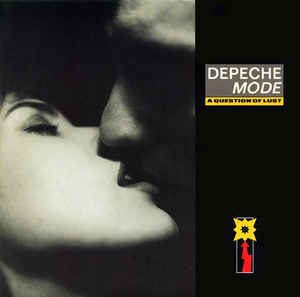
"A Question of Lust" is a song by the English electronic music band Depeche Mode from their fifth studio album, Black Celebration (1986). It was released on 14 April 1986 as the album's second single.

"Drive" is a song by American alternative rock band R.E.M. It is the first track on and the lead single from their eighth studio album, Automatic for the People (1992), and was the first song lead singer Michael Stipe wrote on a computer. "Drive" peaked at number 28 on the US Billboard Hot 100, number one on the Billboard Modern Rock Tracks chart, and number two on the Billboard Album Rock Tracks chart. Internationally, "Drive" became R.E.M.'s then-second-biggest hit on the UK Singles Charts, peaking at number 11, and their biggest hit in Norway until "Supernatural Superserious" in 2008, reaching number three. Elsewhere, the song reached the top 10 in Canada, Ireland, New Zealand, and Switzerland.

"Somebody to Love" is a song by the British rock band Queen, written by lead singer and pianist Freddie Mercury. It debuted on the band's 1976 album A Day at the Races and also appears on their 1981 compilation album Greatest Hits.
"Breakfast in Bed" is a soul–R&B song written by Muscle Shoals songwriters Eddie Hinton and Donnie Fritts for Dusty Springfield. It takes a knowing spin on the line "You Don't Have to Say You Love Me", the title of a song that had previously been a number one hit for her in the UK. After being released on her 1969 album Dusty in Memphis, it was recorded and popularized the same year by Baby Washington. Harry J produced three reggae versions in 1972, by Lorna Bennett, Scotty, and Bongo Herman.

"Killer" is a song by British DJ and record producer Adamski. It was written by Adamski and British singer-songwriter Seal, who also provided vocals, although the original release is credited solely to Adamski. It was released in March 1990 by MCA Records as the first single from Adamski's second album, Doctor Adamski's Musical Pharmacy (1990), and reached number one on the UK Singles Chart. The single spent four weeks at the top in May and June 1990 and sold over 400,000 copies in the UK, earning it gold certification. It also reached number one in Belgium and Zimbabwe and number two in the Netherlands and West Germany.
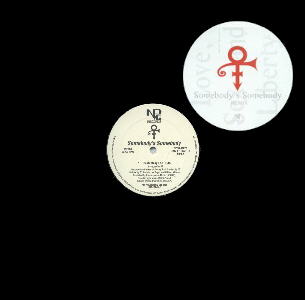
"Somebody's Somebody" is a song from Prince's 1996 album Emancipation.

Prince released several hundred songs both under his own name and under pseudonyms and/or pen names, as well as writing songs which have been recorded by other artists. Estimates of the actual number of songs written by Prince range anywhere from 500 to well over 1,000. He has released 117 singles, 41 promotional singles, 24 internet singles, and eight internet downloads.

Somebody Else's Fire is a studio album by American country music artist Janie Fricke. It was released in June 1985 via Columbia Records and was a collection of ten tracks. The disc was the tenth studio record released in Fricke's music career. The album reached the American country LP's chart in 1985 and spawned three singles. Its highest-charting single was the lead release titled "She's Single Again", which climbed to the number two spot in the United States and Canada. The album received a favorable review from AllMusic.



















